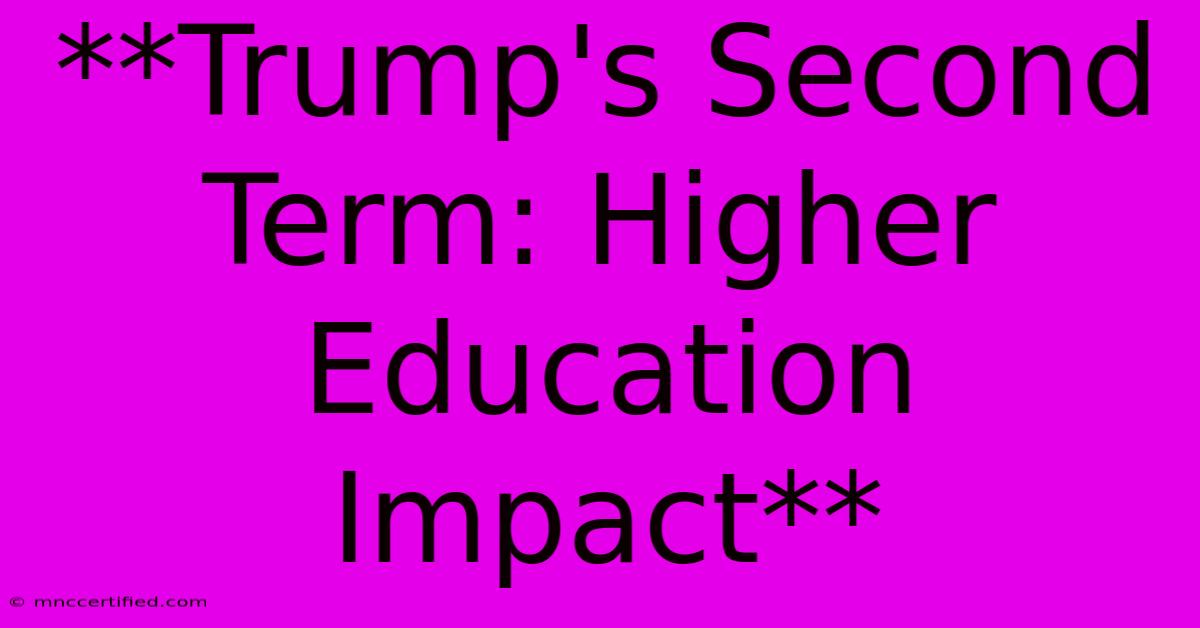**Trump's Second Term: Higher Education Impact**

Table of Contents
Trump's Second Term: Higher Education Impact – An Unfulfilled Promise?
Donald Trump's presidency was marked by significant shifts in American politics, with reverberations felt across numerous sectors, including higher education. While he championed a "school choice" agenda, his policies on funding, regulations, and immigration raised concerns within the academic community. This article explores the potential impact of a second Trump term on higher education, analyzing the implications of his existing policies and potential new initiatives.
The Legacy of Trump's First Term
During his first term, Trump's administration focused on:
- Deregulation: The Department of Education loosened regulations surrounding student loans, simplified the Free Application for Federal Student Aid (FAFSA), and rolled back Obama-era regulations on college affordability and access.
- School Choice: Trump championed school choice initiatives, supporting vouchers and charter schools, which proponents argue offer greater options and competition in the education market. However, critics argued these initiatives divert funding from public schools and exacerbate existing inequalities.
- Immigration Restrictions: Trump's immigration policies, including travel bans and restrictions on student visas, significantly impacted international student enrollment and academic research collaborations.
A Second Term: Potential Policy Directions
While a second Trump term would have likely continued existing trends, some analysts predicted:
- Increased Funding for Private Institutions: Trump's focus on school choice could have potentially led to further funding for private institutions, including religious colleges, at the expense of public universities.
- Expansion of "School Choice" Programs: Trump's administration was likely to push for expansion of voucher programs and charter schools, potentially leading to a further shift in educational funding and resources.
- Continued Immigration Restrictions: Trump's administration might have continued to implement restrictive immigration policies, further impacting international student recruitment and academic collaboration.
The Potential Impact on Higher Education
A second Trump term could have had significant consequences for higher education, including:
- Increased Financial Strain on Public Universities: Further funding cuts for public universities could have resulted in higher tuition fees, reduced faculty salaries, and diminished research opportunities.
- Disproportionate Impact on Minority Students: Limited access to quality education and financial aid could have disproportionately impacted minority students, exacerbating existing racial and socioeconomic inequalities.
- Erosion of Academic Freedom: Trump's emphasis on "patriotic education" and his criticism of "political correctness" might have led to a chilling effect on academic freedom and open discourse on campuses.
Moving Forward: Addressing Concerns and Seeking Solutions
Regardless of the political landscape, the future of higher education hinges on addressing crucial challenges:
- Affordability and Access: Prioritizing policies that make education accessible to all, regardless of background or socioeconomic status, is essential.
- Support for Public Universities: Adequate funding for public universities is crucial for maintaining quality education and research opportunities.
- Protecting Academic Freedom: Safeguarding academic freedom and open discourse is vital for fostering intellectual growth and innovation.
- Bridging the Diversity Gap: Addressing racial and socioeconomic inequalities in access to higher education is paramount for building a more equitable and inclusive society.
In conclusion, a second Trump term could have potentially further shifted the landscape of higher education, with both positive and negative implications. While the future of higher education remains uncertain, addressing critical challenges and prioritizing policies that promote inclusivity, affordability, and academic freedom will be crucial for shaping a vibrant and accessible educational system for future generations.

Thank you for visiting our website wich cover about **Trump's Second Term: Higher Education Impact**. We hope the information provided has been useful to you. Feel free to contact us if you have any questions or need further assistance. See you next time and dont miss to bookmark.
Featured Posts
-
Adrian Dunbar On Line Of Duty Return
Nov 13, 2024
-
Arsenal Women Dominate Juventus In Champions League
Nov 13, 2024
-
Martin Lewis Car Finance Cashback Now
Nov 13, 2024
-
How To Watch Nba Cup Online In 2024
Nov 13, 2024
-
Suspension Of Insurance Endorsement
Nov 13, 2024